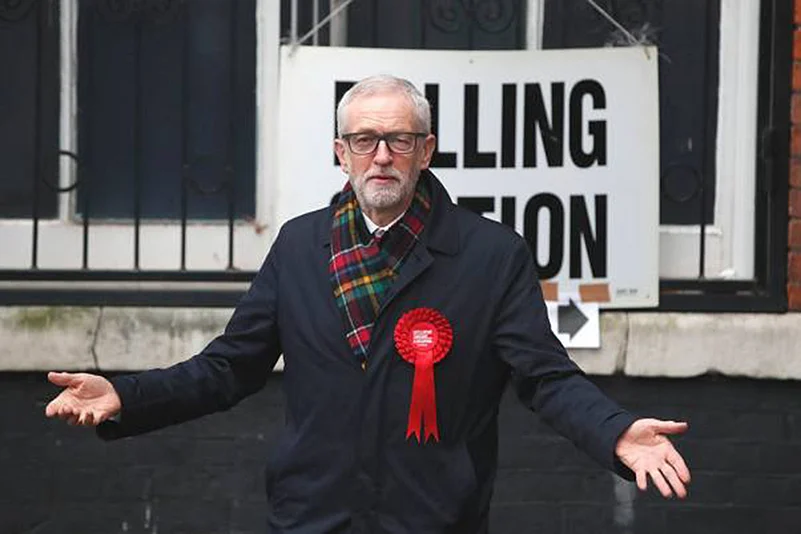British politician and former leader of the UK Labour Party Jeremy Corbyn will be participating in the ‘Summit for Vaccine Internationalism’ organized by the global coalition-- Progressive International (PI). The virtual summit will focus on the need to speed up production, distribution and delivery of Covid-19 vaccines across the globe and various ministers, Opposition leaders, vaccine manufacturers, healthcare workers, and public policymakers will take part in it. It is scheduled to take place from June 18-21. The attendees will respond to the Covid crisis by developing a global plan to guarantee open access to vaccines and treatments, construct and expand production facilities across the globe, and deliver a framework for equitable distribution. Ahead of the summit, Corbyn spoke to Outlook on the G-7 pledge to donate one billion vaccines to poor countries and the need for vaccine internationalism. Excerpts:
Advertisement
Q) What’s your reaction to the pledge by the G-7 to donate one billion Covid-19 vaccines to poorer countries? Do you think the world urgently needs an action plan to address vaccine inequity rather than “passing around the begging bowl”?
The starting point should be to ask what resources are needed to vaccinate the world as swiftly as possible, not what resources richer countries are happy to give away. The COVAX vaccine donation scheme has already left a trail of broken promises in its wake, powerless as it is to deal with export bans and vaccine hoarding. Solidarity, not charity – in the form of an WHO action plan for vaccine equality – is the only thing that can fix this crisis.
Advertisement
Q) Though the UN and WHO have been critical of rich countries and their attempts to address vaccine asymmetry, the stiff resistance by pharma companies regarding the TRIPS waiver remains the biggest impediment in global equitable access to the vaccine. What is the way forward?
It is a disgrace that richer countries can use a rigged trade system to deny access to vaccination for the majority of the world’s population. We need to build a movement everywhere for putting public health before the demands of Big Pharma. Only sustained and widespread pressure on governments in the Global North will push richer countries toward a TRIPS waiver policy, as has happened in the United States.
Q) Why does the world need vaccine internationalism? In the present scenario, 90 per cent of Covid-19 vaccines have been restricted to countries such as the US and Europe. How can we bridge the gap between the Global South and the imperialist West? Can vaccine internationalism ensure global equity?
No-one is safe until everyone is safe. The coronavirus crisis has demonstrated how connected we are, and how the most vulnerable are treated, impacts us all. The longer people anywhere remain unvaccinated, the more the chance increases of vaccine-resistant strains undoing all the progress we have made.
If we can win the argument for vaccine internationalism and demonstrate what happens when we acknowledge and tackle the injustices inherent in the current system, we will be in a far better position to tackle the climate crisis, and every other threat we face which is worsened by extreme inequality within and between countries.
Advertisement
Q) How important is the Summit for Vaccine Internationalism at this juncture?
The Summit for Vaccine Internationalism is a chance to unite, mobilize, and organize progressive forces across the world. The billionaires and their government backers are organized across borders and we must be too. The summit is an opportunity for campaigners to share their experience of the coronavirus crisis and of dealing with the injustices it has exposed, to share ideas and strategies, and to offer each other support and solidarity in our common struggle: for a world that puts human life before profit.
We cannot wait for good sense to prevail in the boardrooms and government offices of the most powerful. We have to provide solutions ourselves. That’s why I am so inspired to see governments from the Global South come together to find collective solutions to end the pandemic.
Advertisement
Socialists and progressives in the UK pledge to grow solidarity across borders, to put pressure on our government to change course, and to challenge a rigged trade the system that routinely prevents vital medicines from getting to those who need them most.
Q) What kind of role can India play in the global South since it is one of the largest manufacturers of vaccines?
There is untold potential in countries across the Global South, including in India, that could help end this crisis but remains untapped because of the intransigence of the corporations and most of the world’s richest economies.
Advertisement
We must respond to the escalating crisis by developing a truly global plan to guarantee open access to Covid-19 vaccines and treatments, to construct and expand production facilities across the globe, and deliver a framework for equitable distribution.
I want to see a genuinely global plan that recognizes the role of every nation and its people in vaccinating the world, that can provide a model for ending other diseases and causes of preventable deaths.
Q) British Prime Minister is facing strong criticisms for his handling of the pandemic. Do you think the crisis could have been managed more efficiently?
The UK is a huge base of scientific expertise with a world-class health service. We were in a privileged position to manage a disaster of this kind. Unfortunately, the Conservatives, the governing party, have spent a decade increasing inequality including health inequalities through building a low-wage, low-rights economy; cutting back health and other public services, and making the state-dependent on crony profiteering giants to carry out basic functions. This regime of inequality, cuts, and privatization – as well as choices to follow the demands of markets not medical scientists at the height of the crisis – left us with one of the most severe coronavirus crises in the world. We can never allow such a preventable crisis to be repeated.



















